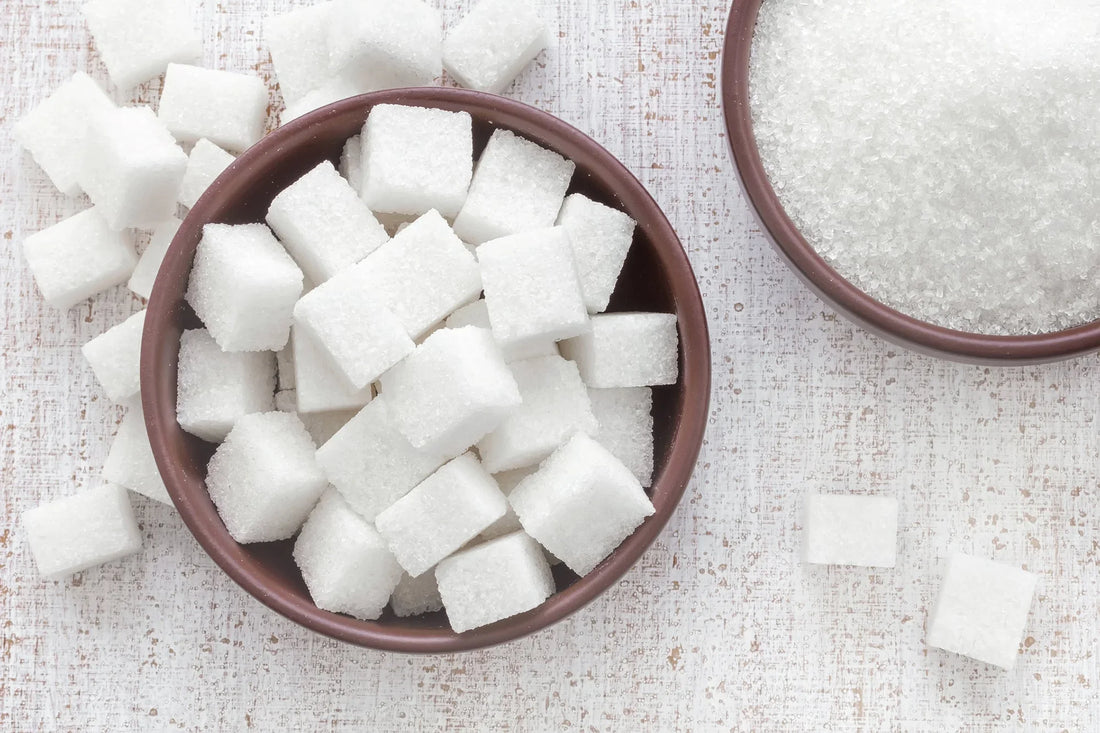If you're a fan of confectionery sweets, it wouldn't hurt to take a look at this article to understand the harmful effects of these sweets and their alternatives.
A healthy human body is more valuable than any precious jewel.
Statistics show that the world average per capita consumption of sugar is estimated about 19 to 20 kilograms. This is quite high if you consider that the World Health Organization recommends that adults and children consume no more than 50 grams of free sugars per day. This means that, on average, people around the world are consuming more than double the recommended amount of sugar.
Sweets, cakes, jams, ice cream, chocolates, gums, desserts, toothpaste, sodas, factory-made fruit juices, and so much more are among the primary products derived from white sugar.
The sugar present in sugar cane and sugar beets, after isolating all minerals, vitamins, proteins, enzymes, and other beneficial nutrients in the purification process in the factory, is converted into pure Sucrose. What remains after this process is a concentrated artificial substance that not only lacks many benefits for the human body but also has harmful effects.

The harmful effects of sugar consumption
The consumption of sweets available in the market made with white sugar can lead to various health issues, including:
1. Chronic Diseases: Continuous consumption of sugar and confectionery items made with sugar can lead to various challenging-to-treat diseases, such as depression, skin issues, female discomforts like ovarian cysts, fibroids, myomas, prolapse of the uterus and bladder, and severe menstrual pains. It can also contribute to various nervous discomforts and constipation.
2. Exacerbation of Infectious Diseases: Those with infectious diseases may experience exacerbation of their condition due to the consumption of white sugar, as microbes thrive and feed on white sugar, potentially worsening their illness.
Reducing the intake of such sugar-laden confectionery items can help in preventing these health issues.
3. Sugar disrupts the body's immune system. After consuming sugar-containing products, white blood cells (neutrophils) stop working for 2 to 5 hours, leaving the body highly susceptible to any form of virus or bacteria. Research indicates that after consuming something sweet, the body's immune system loses up to 75% of its efficiency. This period marks the prime time for microbes and viruses to become active. Following the intake of white sugar or any sugar-laden items, the body's immune system becomes compromised, showing no response to any microbe or virus. Essentially, the body's soldiers are left without the ability to fight, significantly increasing the chances of getting infected if one comes in contact with contagious diseases.
4. The normal body temperature is around 37 degrees Celsius while, some chocolates do not melt until temperatures reach around 60 degrees Celsius. As a result, they accumulate in the intestines, leading to potential infections by fostering the growth of microbes and bacteria. Additionally, sugar causes the production of alcohol in the intestines. This alcohol is absorbed and transported to the brain via the bloodstream, contributing to hyperactivity in children.
5. German researchers, through various experiments, concluded that the consumption of sugar and sweets leads to a 100% increase in the growth of cancerous tumors. The greatest danger of sugar is its ability to break the structure of DNA, altering it and leading to cellular malignancy. Moreover, the production of free radicals in the bloodstream due to sugar intake increases the risk of various types of cancers. Sugar is a primary factor in cancers such as breast, prostate, colon, and rectal cancers.
6. Sugar is a primary factor in obesity: Sugar consumption leads to an increase in fructose in the body. Glucose, present in sugar, is utilized in the body's organs, while the liver is the only organ responsible for processing fructose. Accumulated fructose in the liver transforms into fat. Sugar is a major factor in weight gain.

7. Sugar is the primary factor in bone fragility: It's an additional substance devoid of any vitamins or minerals, and the body can't effectively digest or absorb it. Cells are forced to utilize calcium and magnesium stored in the bones to break down sugar molecules. The more sugary items consumed, the more calcium leaches from the bones, utilized in the sugar digestion process. Over time, this leads to bone fragility. Sugar disrupts the absorption of calcium and magnesium. If you consume a glass of milk with cake or chocolate, no calcium will be stored in your bones!
Note:
This is also the primary reason for dental decay – calcium is extracted from the teeth, causing them to decay over time. Consuming milk at such times is not beneficial, especially if paired with cake and sweets. Sugar acidifies the mouth, harming the teeth. Sugar is the sole cause of tooth decay – without sugar consumption, one wouldn't require a dentist.
8. Sugar consumption reduces the flexibility of muscles and body parts, causing muscles to contract and ache with even the slightest physical movement.
9. Sugar causes excessive secretion of the hormone adrenaline in the body, leading to feelings of heightened anxiety, restlessness, and irritability.
10. The most dreadful disease of the century, Alzheimer's, which begins with small memory loss, is believed to be linked to sugar consumption. This implies that within the next 25 years, half of the global middle-aged population will suffer from Alzheimer's, facing a distressing fate.
11. Sugar is the primary factor in depression. Common belief suggests that consuming something sweet will uplift one's spirits, while it's completely the opposite. The happiness derived from consuming sweets is due to the addiction one has developed, providing a temporary sense of relief. However, it has adverse effects on your mood and brain waves.
12. Sugar induces boredom, and those who consume it have no inclination towards exercising or physical activities.
13. Sugar increases brainwave frequencies like delta, alpha, and theta waves, ultimately reducing an individual's concentration and decision-making abilities.
14. Sugar disrupts the body's mineral balance. Why? Because sugar is a substance devoid of vitamins, minerals, and fiber. It's an excess substance that the human body struggles to digest and absorb. To break down the molecular structure of sugar, the body is compelled to utilize the mineral resources dissolved in the body. Consequently, this disrupts the balance of minerals such as calcium, magnesium, potassium, sodium, and others.
15. Contrary to what doctors might suggest, consuming fattier foods doesn't elevate triglycerides; instead, it's sugar consumption that increases triglycerides.
16. Unlike common belief, it's sugar that significantly elevates bad cholesterol (LDL) while reducing good cholesterol, ultimately leading to increased overall cholesterol levels. It's not animal fat that raises cholesterol.
17. Allergies to various foods can result from sugar consumption.
18. The development of eczema in children can be a consequence of sugar consumption.
19. Sugar reduces the secretion of growth hormone. Short stature in youth is a result of sugar consumption.
20. Sugar disrupts the structure of proteins; as a result, the body won't be able to absorb them.
21. Those who consume sugar absolutely have no inclination towards exercising or physical activities.
22. Untimely and unexplained headaches and migraines are a result of consuming sweet things.
23. Sugar harms the kidneys. The primary cause of kidney and bladder stones is sugar consumption.
24. Sugar increases the risk of blood vessels getting clogged.
25. Sugar disrupts hormone activity.
26. Sugar is the primary cause of high blood pressure.
27. Sugar is not absorbed by the body and remains in the liver.
28. Sugar needlessly increases the amount of glucose in the blood.
29. Sugar increases the risk of heart diseases.
30. Sugar increases the speed of alcohol addiction and the inclination toward drug addiction.
31. Sugar leads to weakened vision. Diabetes occurs due to sugar consumption.
32. Sugar reduces the body's levels of chromium and copper elements.
33. Sugar causes the narrowing of blood vessels, ultimately leading to strokes.
34. Reduction in children's intelligence quotient; sugar causes a decrease in intelligence and lower academic grades in children.
35. Causing digestive problems; contrary to popular belief that when people have heartburn, they eat something sweet to relieve it, sugar actually causes acidity in the stomach.
36. Sugar is a factor in joint arthritis. Those with arthritis who consume a lot of sugary substances deteriorate day by day.
37. Reducing people's life spans from 11 to 20 years.
38. Decreased memory and forgetfulness.
39. Increased likelihood of contracting diabetes.
40. Premature aging of the body, graying of hair, and skin wrinkling are due to the consumption of sweet foods, not the consumption of meat and proteins!

At the end, alternatives to this white poison are mentioned, which keep us away from illness and put us on the path to health.
Substitutes for white sugar:
- Honey
- Dates
- Dried White Mulberry
- Dried figs
- Raisins
- Brown sugar
So, let's not make life bitter for our bodies by consuming this sweet substance.




